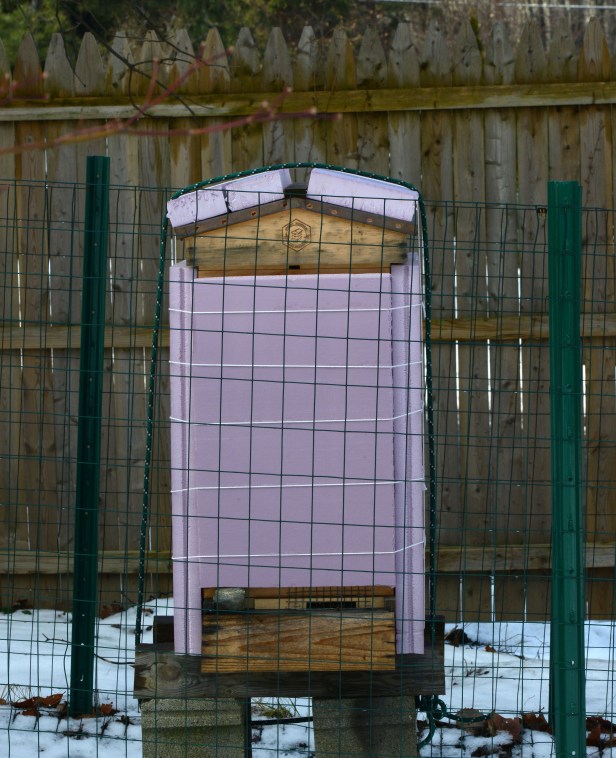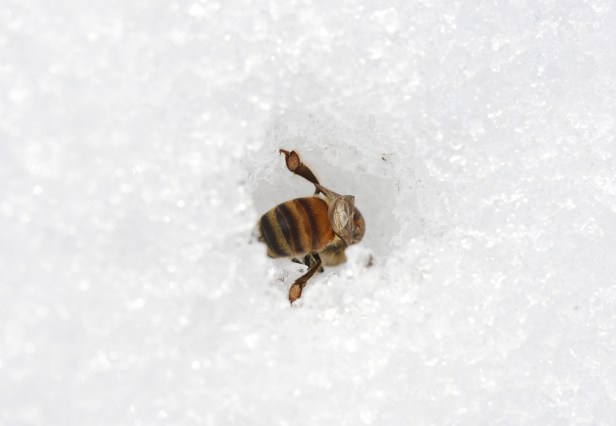My Way of Wintering the Bees
This is my first winter as a beekeeper. I’m trying my best to help my bees survive through the winter. There is a lot of conflicting information out there about wintering the hive, especially, when it comes to insulating the hive. One apiarist suggested that it’s not necessary to insulate the hive in winter since it will confuse the bees and make them take more stored food than they usually do if they are left alone. Another suggested that insulating the hive is a good idea because the bees will not have to work too hard to keep the temperature warm inside the hive. Since they don’t have to work their wings that hard, they will take less food.
The same goes for treating the bees for Varroa mites; some folks recommended doing it but some did not. Just keeping the bees healthy and well fed is enough. Healthy bees and a clean hive will be able to fight all and will produce a stronger next generation.
I try to get as much information on beekeeping as possible, conflicting or not, then pick and choose to use what makes sense for my hive. I don’t treat my hive for mites since they were pretty healthy when I last checked before closing the hive for the winter. They were well fed as well. I also think that there are not very many hives in this area; the population is not as condensed which makes it harder for parasites and diseases to transmit from hive to hive.

I decided to insulate the hive since I know how harsh winter can be in my neighborhood. The bees I started the hive with also came from the south, Georgia, and they are Italian bees which don’t usually do well in a very cold winter. I put 2″ of insulation foam board on four sides and the roof, left open just the main entrance, upper entrance and a small ventilation hole on top.
After almost a week of frigid temperatures, with daytime temperatures hovering around 3° F-5° F and a wind chill factor that took it down to -5° F at times, I’m very glad I insulated my hive. There are some dead bees on the ground in front of the hive and some in the snow further away. I guess the ones on the snow are the bees that flew out to die so they won’t burden the undertaker bees who have to push the dead out of the hive.
The temperature was up to 45° F today and the sun came out once in a while. I checked to see whether everything was still intact with the hive. To my surprise, a couple of bees flew out. I checked the foam board under the hive for mites and there were very few of them.

One thing that may work for the benefit of my hive is that the queen was born in our garden. From what I’ve read, the hive will most likely survive the winter if the queen was born here, not brought in from radically different zone. The original Italian-Georgian queen I started the hive with flew away with half the hive when they swarmed back in July.
They are doing alright so far. Hopefully, they will survive the winter and build a strong hive this coming spring.

Sounds like you’ve done everything you can. Might want to throw some fondant in there as a precaution, though, as the coming months can see them going through their stores pretty quickly. Good luck!
After reading your comment, I think I’ll make fondant this weekend. Organic sugar is not a problem but no luck in searching for an organic corn syrup (light). Organic corn syrup exists but they all come with vanilla added. Will the vanilla be a problem if I use it to make the fondant, you think? The dark one (non-organic) I found, even has salt in it!!!
I’ll do my best to keep them happy.
My name is Kim and I am a student at the University of New Mexico. I’m taking a special honors course entitled “Zen and the Art of Beekeeping,” and I have chosen your blog to share with our class. Please visit our site here: http://zenandtheartofbeekeeping.wordpress.com/ — other than that, I would love to talk with you some more about you beekeeping experiences. Thank you!
Thank you. I’m honored. I’m not sure what petty fears you refer to, but if they involve animals or insects, know that animals and insects differ from humans in one major aspect, they never intend to hurt just for the sake of hurting. Despite having venom and stingers, honeybees mind their own business and co-exist with us without acrimony. Obviously they share their wealth with us, if not voluntarily, still, without attack. How can you beat that.
I agree that most beekeepers feel that the bees are their children. We have a responsibility to them in return for what we take from them. Though children of a sort, we have a symbiotic relationship that carries responsibility for balance with the give and take.